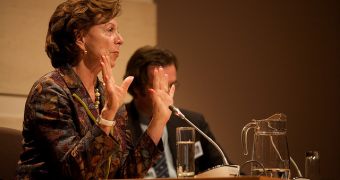Neelie Kroes, vice-president of the European Commission responsible for the Digital Agenda, stated at the Forum d'Avignon that the fight against piracy is not at all effective, large sums of money being spent in vain.
According to TorrentFreak, Kroes doubts that the current copyright system is the best way of protecting artists and their work.
In her speech called “Who feeds the artist?” she says she's highly aware of the fact that much talent and creativity comes from Europe.
“We must be concerned about the fate of Europe's struggling artists and creators. Art feeds the soul. But who feeds the artist?,” Kroes said.
She explained that while most artists in Europe earn less than 1000 EUR ($1,300) each month from their copyright work, the current laws and systems that should protect copyright are inefficient, since instead of making the artists and their work known, they rely on the fear and intimidation factor.
“We need to keep on fighting against piracy, but legal enforceability is becoming increasingly difficult; the millions of dollars invested trying to enforce copyright have not stemmed piracy,” she added.
“Meanwhile citizens increasingly hear the word copyright and hate what is behind it. Sadly, many see the current system as a tool to punish and withhold, not a tool to recognize and reward.”
The commissioner believes that creativity and out-of-the-box thinking are the key to solving these problems and offering real chances for artists to monetize their creations. She also fears that soon even cloud computing and the way it functions will ”raise new questions about how licensing should function in an optimal way.”
“It's not all about copyright. It is certainly important, but we need to stop obsessing about that. The life of an artist is tough: the crisis has made it tougher. Let's get back to basics, and deliver a system of recognition and reward that puts artists and creators at its heart,” Kroes concluded.

 14 DAY TRIAL //
14 DAY TRIAL //